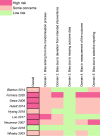Dietary consumption of beef and red meat: a scoping review and evidence map on cognitive outcomes across the lifespan
- PMID: 37800340
- PMCID: PMC10755455
- DOI: 10.1017/S1368980023001933
Dietary consumption of beef and red meat: a scoping review and evidence map on cognitive outcomes across the lifespan
Abstract
Objective: Mixed evidence exists on the impact of beef consumption on cognition. The goal was to create an evidence map capturing studies assessing beef consumption and cognition to reveal gaps and opportunities in the body of literature.
Design: A scoping review was conducted to locate studies up to March 2022 using PubMed and backwards citation screening. Data were extracted by two independent reviewers with conflict resolution, and a database was created and made publicly available.
Setting: Intervention and observational studies.
Participants: Humans of any age, sex and/or health status, without moderate to severe cognitive impairment and/or abnormalities.
Results: Twenty-two studies were identified that quantified beef or red meat intake and assessed cognition. Six studies assessed beef intake, with the remaining studies describing intake of red meat that may or may not include beef. Nine articles described randomised controlled trials (RCT), mostly conducted in children. Thirteen described observational studies, primarily conducted on adults and seniors. The most common cognitive domains measured included intelligence and general cognition, and memory. The majority of controlled studies were rated with high risk of bias, with the majority of observational trials rated with serious or greater risk of bias.
Conclusions: Red meat and beef intake and cognition is largely understudied. There is a significant lack of replication across study designs, populations, exposures and outcomes measured. The quality of the research would be considerably enhanced by focused assessments of beef intake (and not red meat in general) and specific cognitive domains, along with improved adherence to reporting standards.
Keywords: Beef; Cognition; Dietary intake; Red meat; Scoping review.
Conflict of interest statement
Author SAF has ownership in Traverse Science. TLP and SAF are employees of Traverse Science.
Figures






Similar articles
-
Impact of Beef and Beef Product Intake on Cognition in Children and Young Adults: A Systematic Review.Nutrients. 2019 Aug 3;11(8):1797. doi: 10.3390/nu11081797. Nutrients. 2019. PMID: 31382632 Free PMC article.
-
Trends in Beef Intake in the United States: Analysis of the National Health and Nutrition Examination Survey, 2001-2018.Nutrients. 2023 May 26;15(11):2475. doi: 10.3390/nu15112475. Nutrients. 2023. PMID: 37299438 Free PMC article.
-
Effectiveness of provision of animal-source foods for supporting optimal growth and development in children 6 to 59 months of age.Cochrane Database Syst Rev. 2019 Feb 19;2(2):CD012818. doi: 10.1002/14651858.CD012818.pub2. Cochrane Database Syst Rev. 2019. PMID: 30779870 Free PMC article. Review.
-
Red and Processed Meat Consumption and Risk for All-Cause Mortality and Cardiometabolic Outcomes: A Systematic Review and Meta-analysis of Cohort Studies.Ann Intern Med. 2019 Nov 19;171(10):703-710. doi: 10.7326/M19-0655. Epub 2019 Oct 1. Ann Intern Med. 2019. PMID: 31569213
-
Effect of the Intake of Lean Red-Meat from Beef-(Pirenaica Breed) versus Lean White-Meat on Body Composition, Fatty Acids Profile and Cardiovascular Risk Indicators: A Randomized Cross-Over Study in Healthy Young Adults.Nutrients. 2022 Sep 9;14(18):3724. doi: 10.3390/nu14183724. Nutrients. 2022. PMID: 36145099 Free PMC article. Clinical Trial.
Cited by
-
The Association between Individual Food Groups, Limbic System White Matter Tracts, and Episodic Memory: Initial Data from the Aiginition Longitudinal Biomarker Investigation of Neurodegeneration (ALBION) Study.Nutrients. 2024 Aug 19;16(16):2766. doi: 10.3390/nu16162766. Nutrients. 2024. PMID: 39203902 Free PMC article.
References
-
- Papalia DE & Feldman RD (2011) A Child’s World: Infancy through Adolescence, 12th ed. New York: McGraw-Hill.
-
- Prado EL & Dewey KG (2014) Nutrition and brain development in early life. Nutr Rev 72, 267–284. - PubMed
-
- Chen X, Maguire B, Brodaty H et al. (2019) Dietary patterns and cognitive health in older adults: a systematic review. J Alzheimer’s Dis 67, 583–619. - PubMed
-
- Angeloni C, Businaro R & Vauzour D (2020) The role of diet in preventing and reducing cognitive decline. Curr Opin Psychiatry 33, 432–438. - PubMed
-
- Scarmeas N, Anastasiou CA & Yannakoulia M (2018) Nutrition and prevention of cognitive impairment. Lancet Neurol 17, 1006–1015. - PubMed
Publication types
MeSH terms
LinkOut - more resources
Full Text Sources

